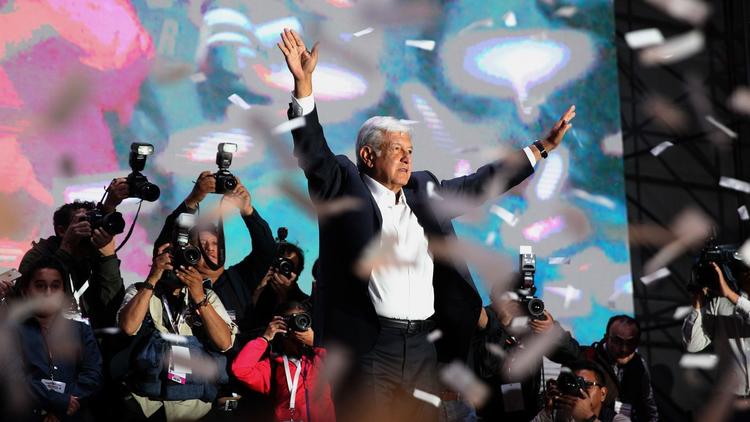Q seismic jolt just swept over our neighbor to the south. Mexicans elected as their next president Andres Manuel Lopez Obrador, a longtime leftist who has risen to power buoyed by much the same anger with the status quo that put Donald Trump in the White House.
Lopez Obrador’s “Mexico first” message to voters resonated deeply with a country fed up with previous administrations seen as elitist, corrupt and indifferent to the plight of the impoverished. Time will tell whether he can deliver on the lofty promises he’s made, including a pledge to end all corruption, which he claims will generate billions of dollars that he will use to uplift the poor.
His rhetoric about the U.S. — he would like to scale back Mexican imports of U.S. farm goods and promised to ensure his country’s oil never falls “back into the hands of foreigners” — suggests potential for combative ties with the U.S. But Mexico’s economy has seen anemic growth, and frosty relations with Washington would only worsen his country’s economic doldrums.
Instead, Lopez Obrador would be smart to quickly find common ground with Trump, and collaborating on a reworked North American Free Trade Agreement is the place to start. What tack Lopez Obrador will take on NAFTA isn’t known yet. Historically, he has been critical of the trade pact, though during the campaign he and his advisers talked of preserving it.
That’s a good sign. Economic growth is a lot easier to forge with free trade. Protectionism and tariffs shrink markets, and that’s bad for both sides of the border. Illinois has particularly benefited from NAFTA. In 1993, before the pact kicked in, the state exported less than $6.4 billion in goods to Canada and Mexico. By 2015, Illinois exports to those countries reached $26 billion, amounting to 41 percent of the state’s total export output.
Trump, however, appears to be digging in for a fight. On Sunday, he said he wasn’t happy with the shape of a revised NAFTA deal that his team has been working on, and would rather wait until after the midterm elections in November before signing any agreement. “NAFTA, I could sign it tomorrow, but I’m not happy with it. I want to make it more fair, OK?” Trump told Fox News. Meanwhile, Canada on Sunday began imposing tariffs on American steel, aluminum, ketchup and beef in retaliation for Trump’s imposition of tariffs on Canadian and Mexican steel and aluminum. As the trade battles burgeon, more American companies and farmers feel the bite.
Maybe Lopez Obrador can talk sense into Trump when they sit down for NAFTA talks. Imagine if he’s successful — a leader who’s been likened to the latest Latin American iteration of the late Venezuelan leftist Hugo Chavez getting an American president to take the sensible path toward a reworking of NAFTA.
We accept that NAFTA, which has been around since the mid-1990s, is due for an update. The key is to update without creating wreckage. It’s not just the Mexican and Canadian economies that are at stake. So is America’s, the state of Illinois’ export-oriented economy included.





